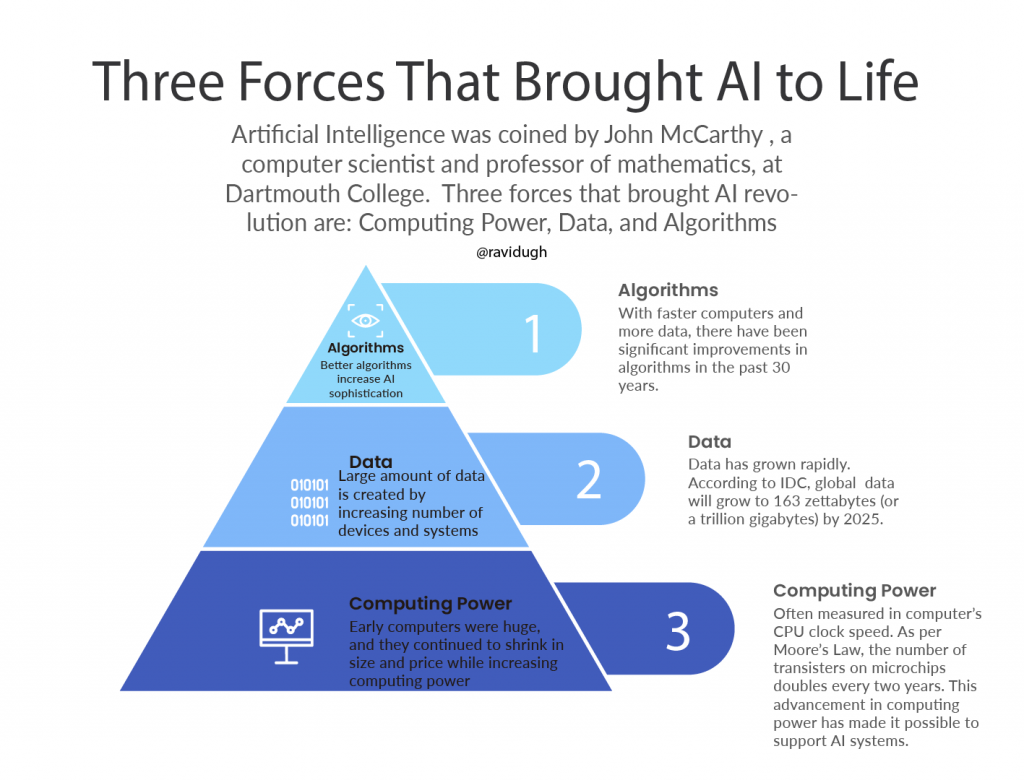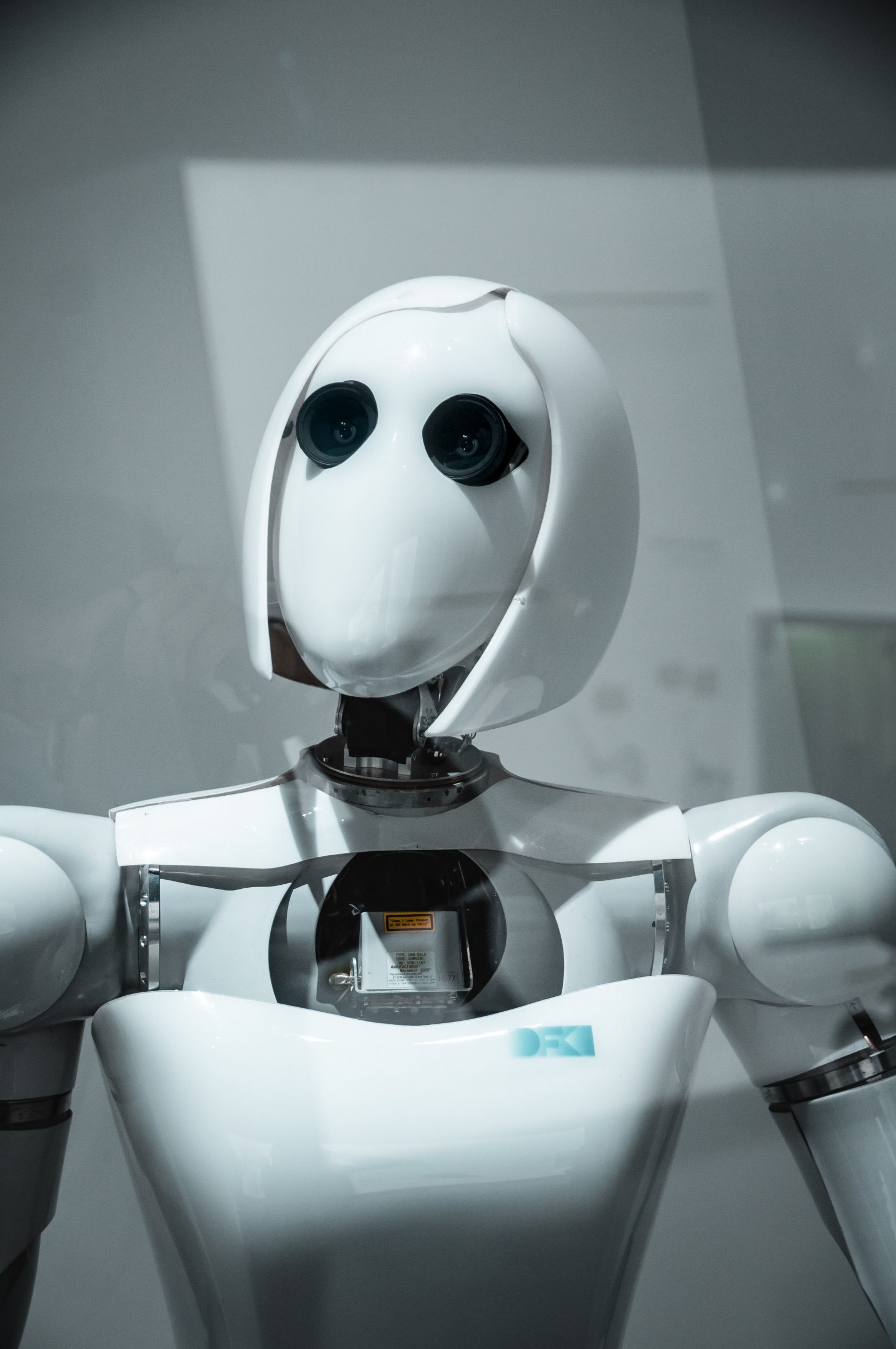Many AI techniques are being used in organizations, and AI will continue to get sophisticated in the third wave of AI. In the Fourth Industrial Age, human creativity, AI at scale, and Emotion AI will be dominant forces that will shape the digital organizations of the future.
What is the Third Wave of AI?
In the first wave, artificial intelligence (AI) systems followed clear rules and were directed at individual applications of the algorithms to cover every eventuality. The second wave was the introduction of deep learning and reinforcement learning systems that mapped inputs to outputs to solve a certain type of problem. This achieved greater adoption than previous approaches. In the third wave, many AI applications will become more than just tools but will function as partners as they acquire human-like communication and reasoning capabilities (Kersting, 2020). Therefore, the questions on AI adoption for enterprise will not whether it worked or not, but more, “what is the most effective use of AI within my organization?”
Three forces that brought AI to life will continue in the Fourth Industrial Age (See Figure 1).

As AI will continue to gain prominence, the “going business” will be about how to effectively leverage it within the enterprise. This is what the third wave of AI looks like: It can look very different from today.
How can AI technologies shape the future?
The third wave of AI is part of an unprecedented convergence of technologies that will improve efficiency, change business models and drive growth. We have seen this convergence with the Internet, mobile, cloud computing, machine learning, analytics, robotics, autonomous vehicles, and so on. The combination of technologies will continue to drive innovation. The convergence of these technologies is increasingly threatening established businesses. If they do not change, they will be disrupted.
Human-led AI will unlock the future of data
The Fourth Industrial Revolution is underway, and it’s making big waves. The first three industrial revolutions were often marked by external forces—the invention of the car or the invention of electricity, for example. The Fourth Industrial Revolution, however, is being led by humans themselves. Humans are developing new technologies that are disrupting existing industries and creating entirely new ones. Such technological advances as AI and the internet of things, among other things, are leading to the Fourth Industrial Revolution. These technologies are transforming how we live and work. The Fourth Industrial Age is not only a period in which more than one set of human-created capabilities coexist, but it is also a period in which the speed and size of the changes driven by technology are increasing.
Human Intelligence in the Fourth Industrial Age will play a key role, people will be more important than ever. Organizations with superior data science talent, people that are making new inventions in engineering, product, technology, etc. will have a competitive edge. As a result, organizations that can quickly adopt technologies or adapt to change will survive. This challenge calls for an ability to observe and interpret data in real-time, an ability to handle uncertainty, and an ability to present these data in compelling ways to customers. AI transparency and trust will be paramount to the further development and acceptance of AI technologies. Only humans can make choices for a transparent and explainable AI to address challenges and ultimately unlock the future of data.
AI at scale will deliver economic value
Many organizations have realized that their decision-making process is too slow. Machine learning (ML) is a great way to help solve this problem. Large and medium-sized companies are already using machine learning, but the firms that will excel in this emerging market are the organizations that can successfully embed machine learning techniques in their operations. For startups that are digital at their core may have an advantage as they can design agile workflows and efficient processes.
With ongoing digital transformation initiatives, many organizations will become digitalized to a certain extent, allowing them to “hack” some of their processes and become better, faster, and more productive. However, only those companies that can deploy AI at scale can deliver the economic value potential of this technology. In traditional companies, the economics of scale is one lever to keep the costs down and create value. In digital organizations of the future, the technology must be scaled across all organizational processes, workflows, etc. to optimize decision making and operations. MLOps (Machine Learning Operations) will standardize, optimize, and automate processes. These companies will transform AI workflows better than others, and this will be reflected in their products and services. Only AI at scale can truly unlock and deliver economic value.
Machines with emotional intelligence will drive adoption
The next big trend in the AI industry is emotional intelligence. This could come in the form of software or robots that can interact with humans. With Emotion AI, machines will be able to measure, understand, simulate, and react to human emotions, hence, they can work more effectively with humans (Somers, 2019). This will help them solve problems faster and make decisions based on human values like empathy, valuing diversity, and sensitivity to cultural differences. One of the largest challenges of AI and Robotics is that they still cannot master the language of people. You must think about the structure of speech, the rhythm, the intonation, and the nonverbal cues. To actually “speak” human language, machines must also know about the meaning of the words, the emotional state of a person, and so on. It will be a while until machines can emulate human emotions and demonstrate thinking abilities. So, how can you leverage AI to improve your business?
There is a new branch of AI called Cognitive Computing, and it refers to smart decision systems that simulate reasoning and human behavior. Cognitive computing systems have several key features such as adaptive (ability to make real-time adjustments as per environment), interactive (ability to interact with users and other devices and information processors), iterative and stateful (ability to identify problems by asking questions or retrieving additional data), and contextual (ability to handle structured and unstructured text, images, audio, and sensor data)(Wikipedia). While cognitive computing holds promise but there is a legitimate worry about privacy issues. I believe that the benefits of technology should outweigh its cost, and cybersecurity and trustworthy AI can accelerate the adoption of Emotion AI technologies.
Who can contribute to a company’s success?
Executives: Chief executives need to be acutely aware of their team’s need to stay agile to remain relevant. More and more organizations are seeking and adopting agile methods.
Board of Directors: Boards need to know the ability of the C-suite to adapt to industry changes, customer demand, and market needs. Boards need to have a strong understanding of their role in driving the business through the fourth industrial age.
Decision-makers: Decision-makers need to be aware of how AI is changing the business landscape and transforming how we as humans interact with machines.
Data scientists: Every business is a data business as every business has data and generates data. Therefore, access to data scientists and other types of analytical talent will be necessary to create new products, optimize operations, predict trends, and automate decision-making.
Technology savvy professionals: AI presents a unique opportunity for business professionals to interact and work in new ways to improve efficiency and productivity. These professionals could reside in any function such as marketing, sales, supply chain, customer support, HR, etc.
Conclusion
The Fourth Industrial Age has started. While it’s difficult to see all the technologies at the same time, it is evident that the Era of the AI and automation is at hand. Human intelligence will be augmented by AI that amplifies and extends human capabilities, and robotics will assist humans with many physical tasks. MLOps is relatively new, and it will continue to speed to embed AI organization-wide to improve the reliability of AI solutions. In near future, we will see an increase in Emotion AI technologies and robotics capabilities that will have a positive impact on the lives of humans as well as on the efficiency of organizations. In the Fourth Industrial Revolution, it’s going to be more a matter of how you use AI and not just what it can do for you. Human creativity and problem-solving skills will always be in demand.
Sources:
Kersting, K. (2020). Rethinking Computer Science Through AI. KI – Künstliche Intelligenz, 34(4), 435-437. doi:10.1007/s13218-020-00692-5
Somers, M. (2019). Emotion AI, explained. Retrieved from https://mitsloan.mit.edu/ideas-made-to-matter/emotion-ai-explained
Wikipedia. Cognitive computing. Retrieved from https://en.wikipedia.org/wiki/Cognitive_computing
Image Credit: Photo by Maximalfocus on Unsplash
